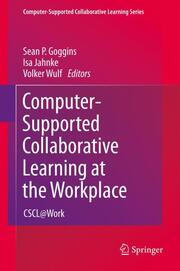Detailansicht
CSCL at Work
Case Studies of Collaborative Learning at Work - Computer-Supported Collaborative Learning Series 14, Computer-Supported Collaborative Learning Series 14
ISBN/EAN: 9781461417392
Umbreit-Nr.: 1855090
Sprache:
Englisch
Umfang: xii, 333 S.
Format in cm:
Einband:
gebundenes Buch
Erschienen am 10.05.2013
Auflage: 1/2013
- Zusatztext
- This book is an edited volume of case studies exploring the uptake and use of computer supported collaborative learning in work settings. This book fills a significant gap in the literature. A number of existing works provide empirical research on collaborative work practices (Lave & Wenger, 1987; Davenport, 2005), the sharing of information at work (Brown & Duguid, 2000), and the development of communities of practice in workplace settings (Wenger, 1998). Others examine the munificent variation of information and communication technology use in the work place, including studies of informal social networks, formal information distribution and other socio-technical combinations found in work settings (Gibson & Cohen, 2003). Another significant thread of prior work is focused on computer supported collaborative learning, much of it investigating the application of computer support for learning in the context of traditional educational institutions, like public schools, private schools, colleges and tutoring organizations. Exciting new theories of how knowledge is constructed by groups (Stahl, 2006), how teachers contribute to collaborative learning (reference to another book in the series) and the application of socio-technical scripts for learning is explicated in book length works on CSCL. Book length empirical work on CSCW is widespread, and CSCL book length works are beginning to emerge with greater frequency. We distinguish CSCL at Work from prior books written under the aegis of training and development, or human resources more broadly. The book aims to fill a void between existing works in CSCW and CSCL, and will open with a chapter characterizing the emerging application of collaborative learning theories and practices to workplace learning. CSCL and CSCW research each make distinct and important contributions to the construction of collaborative workplace learning.
- Kurztext
- This book fills the void between existing works in Computer-Supported Collaborative Work (CSCW) and Computer-Supported Collaborative Learning (CSCL). CSCL and CSCW each make important and distinct contributions to the construction of collaborative workplace learning and this book fully encapsulates the emerging application of collaborative learning theories and practices to workplace learning. Intended for researchers and practitioners, CSCL at Work first guides the reader through the theoretical and methodologic implications of the latest data. Once a foundation is in place, numerous detailed case studies prompt readers to rethink how workplace training is presently conducted, how more collaborative learning strategies can contribute to higher performance, faster transfer of technology from research and development and other significant workplace output measures. Contrasting with traditional workplace learning, focused on task oriented, practice oriented, or regulatory compliance objectives, CSCL at Work recognizes that creativity and innovation emerges from collaborative learning. Researchers in the fields of CSCL and CSCW need this book to expand their understanding of the intersection of these two related but discrete fields, and to provide guidance in the application of the principles of CSCL in the workplace.
- Autorenportrait
- Dr. Sean Goggins is an Assistant Professor at the College of Information Science and Technology at Drexel University, Philadelphia, PA. His research considers how the uptake and use of information and communication technology creates new opportunities for small groups to come together and perform work, be social and dissipate physical boundaries that have historically restricted the growth of nascent organizations. In particular, Sean focuses his research on the integration of methods from phenomenological research traditions, social psychology, sociology, human information behavior and design studies to explore socio-technical phenomena within organizations and outside of canonical organizational boundaries. Dr. Isa Jahnke is an Assistant Professor at the Centre for Research on Higher Education and Faculty Development of the Dortmund University of Technology, Germany. Her academic background is in sociology, educational sciences and computer science. Isa Jahnke's research considers on new forms of computer-mediated human structures by using new media. In particular, she focuses on the study of socio-technical informal learning by developing theories, concepts and methods. Professor Volker Wulf is on the faculty of information Systems and the director of the Media Research Institute at the University of Siegen. At Fraunhofer FIT, he heads the research group, User-centred Software-Engineering (USE ). He is also a founding member of the International Institute for Socio-Informatics (IISI ), Bonn. In 2006/07 Wulf spent a sabbatical as a Fulbright Scholar at the University of Michigan, Ann Arbor, and at Stanford University, Palo Alto. His research interests lie primarily in the area of Computer Supported Cooperative Work, Knowledge Management, Computer Supported Cooperative Learning, Entertainment Computing, Human Computer Interaction, Participatory Design, and Organizational Computing.
